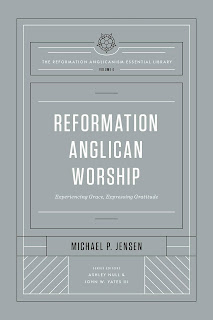Whereas Packer's book focuses on Anglican history through the centuries, Jensen's book focuses on the development of Anglican worship. Rich in history, Jensen outlines the development of Anglican worship with a close eye on Cranmer and his work. He states in the introduction, "My objective is to uncover the roots of the Reformation theology and practice of worship." He continues, "The origins of the distinctive Anglican worship— for which it is best known— lie in a clear step away from the worship of the medieval Catholic Church and the theological convictions that it represented." "...for Cranmer as a liturgist. He was a genuinely theological liturgist, seeking to enshrine a particular gospel by means of his revision of English worship." And, "In this book, therefore, I will be less concerned to outline my preferences for a particular style of church meeting than to explore the theological convictions that made the Anglicanism of the Reformation what it was and is today— and what it could be in the future."
This book is a wealth if information, not just for the Anglican or would-be Anglican, but for all of us who seek true, Biblical worship that is edifying and pleasing to our Triune God.
Casting our eye over the table of contents, we see that Jensen covers a range of topics that historically and currently are of interest.Introduction
1 The Heart of Christian Worship
2 Worship in the English Reformation
3 Reading and Preaching the Scriptures
4 The Gospel Signs: The Sacraments
5 Prayers of Grace
6 Music: The Word in Song Acknowledgments Bibliography
Acknowledgments
Bibliography
General Index
Scripture Index
This work is well written, easy to understand, and quite an enjoyable read. Highlights for me were the last three chapters on The Sacraments, Prayers of Grace, and Music though none of the book should be discounted.
I thoroughly recommend this book for your edification and understanding of true worship.
Quotations taken from: Michael P. Jensen; Ashley Null; John W. Yates III. Reformation Anglican Worship (Kindle Locations 168-213). Crossway.
Crossway has graciously provided a copy of this book. Thoughts and opinions are my own. There are paid links on this page.



